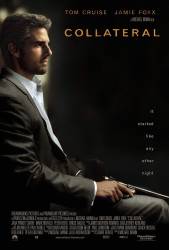Audio problem: Just as the two criminals who robbed Max are walking away, Vincent asks them if that is his briefcase. The guy with the long hair replies, "Yeah it is. Why you want it back?" but his mouth doesn't match what he is saying. It appears he is saying something closer to, "Put up your f**king hands." (00:35:15)

Collateral (2004)
1 audio problem - chronological order
Directed by: Michael Mann
Starring: Tom Cruise, Mark Ruffalo, Jamie Foxx, Jada Pinkett Smith
Other mistake: In the scene where they're loading Tom Cruise's first victim into the trunk, as Max lifts at the arms you can see the "dead" guy holding onto Max's forearms. (00:20:55)
Trivia: The film was almost entirely shot in high definition. Director Michael Mann states he did this to capture the night scenes more vividly.
Question: I noticed from the previews that this movie looks very different. What is it? Is it a digital camera that has been used? Or no lighting effects used? The movie really has a "behind the scene" feel.
Chosen answer: It was shot with a digital camera. IMDB is a great place to answer questions like this. Go to *Technical Specifications* in the *Other Info* section of the menu on the left hand side of the screen. In an interview in American Cinematographer, Michael Mann said that as far as he was aware, this was one of the first movies to attempt to make a "look" out of digital video rather than trying to make Digital Video look like film. This approach meant the movie could be shot in the low-light scenes of urban desolation Mann wanted - because Digital reacts much better to low light than film. The approximately 20% of the picture that was shot on film was mostly, according to Mann, the portion set in the "Fever" nightclub - because this is the scene with the brightest lighting states, a condition in which Digital Video does not perform as well.
Join the mailing list
Separate from membership, this is to get updates about mistakes in recent releases. Addresses are not passed on to any third party, and are used solely for direct communication from this site. You can unsubscribe at any time.
Check out the mistake & trivia books, on Kindle and in paperback.



